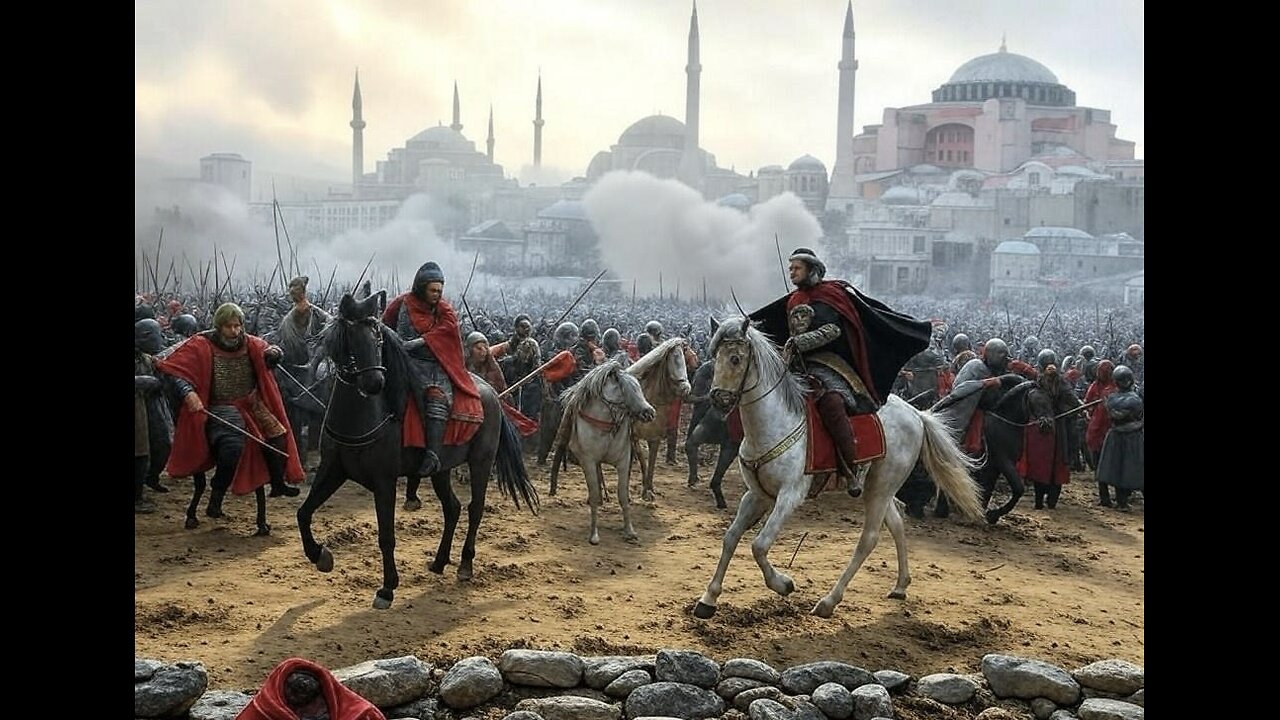Premium Only Content

The fall of Constantinople
The fall of Constantinople, which occurred on May 29, 1453, was a pivotal event marking the end of the Byzantine Empire and the rise of the Ottoman Empire as a major power in Europe and the Near East. Here's a concise description of the event:
The Fall of Constantinople (1453):
- Background: Constantinople, once the grand capital of the Eastern Roman (Byzantine) Empire, had been in decline for centuries due to internal strife, economic troubles, and repeated sieges by various powers. By 1453, it was a shadow of its former glory, with a significantly reduced population and weakened defenses.
- The Siege: The Ottoman Sultan Mehmed II, known as "Mehmed the Conqueror," launched a massive siege on Constantinople. His army, equipped with new technology like large cannons, including the famous "Basilica" cannon, besieged the city. The siege lasted for nearly two months, with several unsuccessful attempts to breach the walls until the final assault.
- The Attack: On the morning of May 29, 1453, after intense bombardment, Ottoman forces managed to breach the walls near the Gate of St. Romanus. Despite fierce resistance, the city's defenders, led by Emperor Constantine XI, were overwhelmed by the sheer numbers and strategic prowess of the Ottoman troops.
- The Capture: Constantine XI died during the battle, and Constantinople fell to the Ottomans. The event is often remembered for the brutal sack of the city that followed, although Mehmed II quickly moved to restore order, converting the Hagia Sophia into a mosque and repopulating the city to reestablish it as the Ottoman capital.
- Consequences:
- Political: The fall of Constantinople ended the Byzantine Empire, which had lasted over 1,000 years. It cemented Ottoman control over the eastern Mediterranean and established Istanbul (renamed from Constantinople) as a major cultural and political center.
- Religious: The event marked a significant shift in the religious landscape, with Islam becoming more dominant in the region. The conversion of Hagia Sophia symbolized this change.
- Cultural: The influx of Greek scholars to the West before and after the fall contributed to the Renaissance, bringing with them ancient texts and knowledge.
- Legacy: This event has been seen through various lenses over time - as a tragic loss for Christendom by some, a glorious conquest by others, and universally as a turning point in world history.
The fall of Constantinople is not just a military event but a profound cultural and historical shift, influencing the course of European, Middle Eastern, and global history.
-
 2:29:00
2:29:00
Steven Crowder
4 hours agoTrump is Winning so Big Even The Left Can't Deny It: Featuring Jason Calacanis of the All In Podcast
213K290 -
 LIVE
LIVE
Side Scrollers Podcast
2 hours agoHasan CAUGHT Red Handed + Hogwarts Legacy 2 “Boycott” + Arbys SUED + More | Side Scrollers
815 watching -
 LIVE
LIVE
TheAlecLaceShow
1 hour agoTrump Signs Historic Peace Deal | Hostages Released | Guests: Matt Schlapp | The Alec Lace Show
94 watching -
 1:03:00
1:03:00
The Rubin Report
2 hours agoObama Can’t Hide His Bitterness at Trump After Middle East Peace Deal
31.5K53 -

The Mel K Show
2 hours agoMORNINGS WITH MEL K - Charting a New Path & Ending Endless Wars - 10-14-25
19.5K1 -
 LIVE
LIVE
The Shannon Joy Show
2 hours agoTrump Declares Peace In The Middle East But A Wartime Economy Emerges. LIVE W/ Analyst Jack Gamble
260 watching -
 LIVE
LIVE
LFA TV
16 hours agoLIVE & BREAKING NEWS! | TUESDAY 10/14/25
2,662 watching -
 31:14
31:14
Grant Stinchfield
2 hours agoShock Move: Trump Shakes MAGA Nation as he Rolls Up His Sleeve for the New COVID Booster!
4.88K10 -
 31:13
31:13
Rethinking the Dollar
2 hours agoPrecious Metals Seesaw: Silver Takes the Lead| Tuesday Morning News Update
13.1K2 -
 1:00:30
1:00:30
VINCE
5 hours agoThe Shutdown Is Even Worse Than You Thought | Episode 146 - 10/14/25
201K191